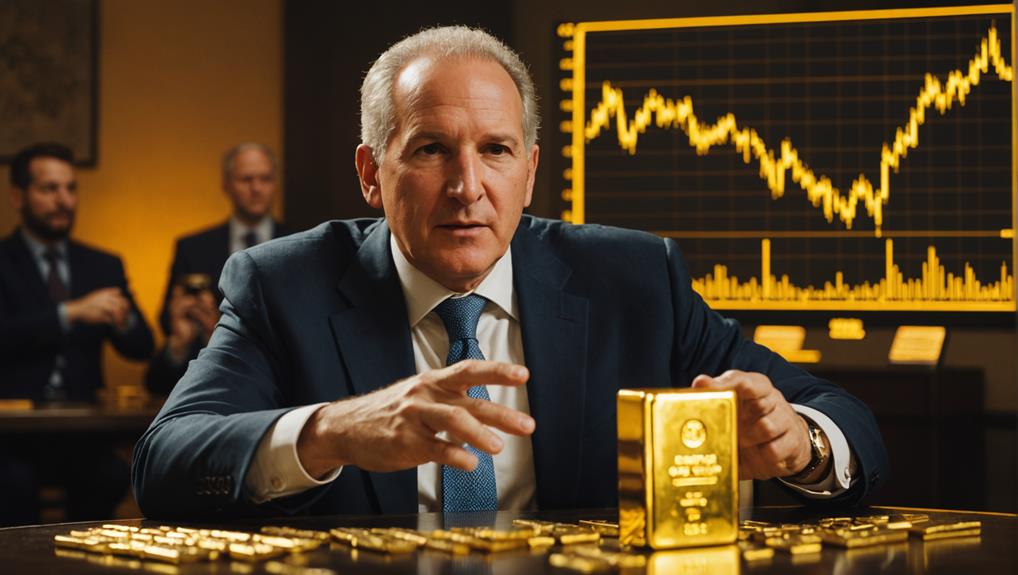Peter Schiff, an esteemed economist, firmly advocates for gold as a cornerstone asset in investment portfolios. His stance revolves around gold's historical track record in safeguarding wealth against inflation and currency devaluation.
In turbulent economic climates, Schiff posits that gold's intrinsic value and limited supply make it a reliable refuge for investors. From physical bullion to gold stocks, Schiff's insights present a compelling case for the enduring appeal of gold.
What specific strategies does he propose to optimize gold investments?
Key Insights
- Gold acts as an effective hedge against inflation and currency devaluation.
- Investing in physical gold ensures wealth preservation and financial stability.
- Gold provides portfolio diversification, reducing investment risk and enhancing stability.
- It serves as a safe-haven asset during economic uncertainty and financial crises.
- Gold's scarcity and intrinsic value safeguard purchasing power over time.
Peter Schiff's Expertise

Peter Schiff, a leading authority in economics and monetary policy, brings a wealth of expertise to the realm of gold investments. As the CEO of Euro Pacific Capital Inc. and the founder of SchiffGold, Schiff places a strong emphasis on wealth preservation and portfolio diversification through strategic gold investments.
SchiffGold offers a wide selection of precious metals, including gold, silver, platinum, and palladium, catering to both seasoned investors and newcomers with competitive prices and secure storage options. Schiff's advocacy for investing in physical gold and silver underscores the significance of tangible assets in ensuring financial stability.
Gold as an Inflation Hedge
Peter Schiff's perspective on gold highlights its historical track record as an effective hedge against inflation by preserving purchasing power. Demonstrating consistent performance as a safe haven asset, gold has outperformed other investment classes during periods of heightened inflation.
Its scarcity and intrinsic value position it as a preferred choice for safeguarding wealth against currency devaluation. By shielding investors from the erosive impacts of inflation, gold retains its value while fiat currencies experience depreciation. This reliability makes gold an essential component in the arsenal of investors looking to shield their assets in times of inflation.
Investing in gold can help mitigate the risks associated with inflation and ensure financial stability.
Portfolio Diversification

Portfolio diversification is an important strategy for reducing investment risk and safeguarding wealth, and gold plays a significant role in this approach.
With its historically low correlation to other assets, gold provides an effective hedge against economic uncertainty and market volatility.
Moreover, gold can protect investment holdings from the adverse effects of currency depreciation and inflation, further enhancing the stability of a diversified portfolio.
Reducing Investment Risk
Investors can effectively reduce investment risk through portfolio diversification. Peter Schiff suggests that incorporating gold into an investment portfolio can play a crucial role in risk management. Gold's historically low correlation with other assets makes it a valuable component for diversification, especially during economic uncertainties.
Schiff advocates for holding physical gold as a hedge against market volatility and potential downturns. By including gold in their portfolios, investors can potentially minimize losses when other asset classes perform poorly. This approach aligns with Schiff's broader view on the wealth preservation benefits of precious metals.
Therefore, integrating gold into a well-rounded portfolio can help investors navigate risk and maintain stability in volatile economic conditions.
Hedging Against Inflation
Gold not only helps mitigate investment risk but also acts as a reliable hedge against inflation, safeguarding purchasing power in times of currency devaluation.
Its historical inverse correlation with other asset classes during inflationary periods makes it a valuable addition to a diversified portfolio.
By incorporating gold into your investment strategy, you can offset the volatility of traditional assets such as stocks and bonds, providing a more stable financial outlook.
Peter Schiff advises allocating a portion of your portfolio to gold to protect against the wealth erosion caused by inflation.
Currency Depreciation Protection
Investing in gold acts as a robust shield against currency devaluation, safeguarding your wealth amidst economic uncertainties. Gold functions as a hedge against currency depreciation, maintaining purchasing power in times of economic instability.
Financial expert Peter Schiff advocates for including gold in your investment portfolio to mitigate the risks linked to fiat currency devaluation. Diversifying investments with gold helps protect assets from the negative impacts of inflation and currency fluctuations. Schiff stresses the importance of holding physical gold assets to ensure stability and safeguard wealth during currency devaluation.
Economic Uncertainty Protection
Economic uncertainty often leads investors to seek assets that can maintain value, making gold an attractive option.
Acting as a hedge against inflation, gold helps protect purchasing power when currency values decline.
Additionally, its status as a safe-haven asset ensures that it provides stability during financial crises, offering a safeguard for investments in turbulent times.
Hedge Against Inflation
Investing in gold serves as a reliable strategy to hedge against inflation, safeguarding wealth and purchasing power amidst economic uncertainties. Throughout history, physical gold, including gold coins, has consistently outperformed many other assets during periods of high inflation, providing robust protection for investors.
Peter Schiff underscores the importance of gold ownership in shielding against currency devaluation and the impact of rising prices. The scarcity and intrinsic value of gold reinforce its status as a safe-haven asset, making it a favored option for those prioritizing stability.
Safeguard Against Crises
During economic turbulence, precious metals, especially gold, hold intrinsic value that acts as a robust shield against financial instability. Peter Schiff staunchly advocates for gold as a safe haven asset amidst economic uncertainties, market volatility, and financial upheavals.
With its proven historical resilience, gold stands out as a secure investment, particularly during crises such as inflation and currency devaluation. Schiff underscores that owning physical gold safeguards investors from the negative impacts of government interventions and fiat currency devaluations.
This protective attribute not only offers a sense of security but also stability, especially in times of global uncertainties. Investing in gold emerges as a strategic approach to safeguard wealth and manage risks in unpredictable economic landscapes.
Physical Gold Vs. Gold Stocks

When considering options for wealth preservation and growth, investors often weigh the benefits of physical gold versus gold stocks.
Physical gold, such as gold bars, offers the advantage of direct possession of a tangible asset, serving as a hedge against economic uncertainty and currency devaluation.
In contrast, gold stocks represent ownership in companies engaged in gold mining, presenting opportunities for potential profits alongside risks tied to company performance and market fluctuations.
Peter Schiff advises a diversified approach, suggesting that blending the intrinsic value of gold with the growth potential of mining companies can provide a balanced strategy for investors.
Historical Performance
Gold's historical performance showcases its resilience and reliability as an investment, particularly evident during times of economic uncertainty. Over the past two decades, gold has delivered an average annual return of approximately 9%, surpassing the S&P 500's 6% return.
This outperformance is especially pronounced during economic downturns like the 2008 financial crisis, where gold not only maintained its value but often saw price increases. Serving as a hedge against inflation, gold underscores its stability by preserving purchasing power when fiat currencies fluctuate.
The fact that central banks worldwide include gold in their reserves further emphasizes its enduring worth. In essence, gold's track record confirms its status as a dependable asset, especially when navigating stock market volatility and economic instability.
Future Price Predictions

Peter Schiff and other analysts predict that gold's price could surge to $5,000 per ounce or beyond due to ongoing economic uncertainty. Schiff's optimism stems from fears of currency devaluation and market instability, positioning gold as a reliable hedge against potential financial turmoil.
Key drivers behind this projection include geopolitical tensions, market unpredictability, currency devaluation, and gold's historical track record of outperforming inflation. These factors collectively reinforce Schiff's confidence in gold's enduring value amidst changing economic landscapes.
Investment Strategy
Peter Schiff's investment strategy emphasizes the importance of including gold as a hedge against economic uncertainty and currency devaluation. He suggests diversifying one's portfolio by incorporating physical gold, silver, and mining stocks. Schiff also recommends the integration of a gold IRA into overall wealth management strategies to protect assets and ensure financial security.
Central to his approach is the belief in gold's enduring value, with a forecast of potentially reaching $5,000 per ounce. By staying vigilant on market trends and factors influencing precious metals prices, Schiff aims to enhance the stability and resilience of investment portfolios, facilitating well-informed financial decisions.
Addressing Critiques

Confronting criticisms head-on, Peter Schiff staunchly defends gold's pivotal role in shielding wealth against economic turbulence and inflation. He champions gold as a hedge, countering doubts about his investment strategy by highlighting its effectiveness in safeguarding against inflation and currency devaluation.
Schiff advocates for diversification through both gold and silver investments to bolster portfolio stability and mitigate risks. Promoting gold as a long-term wealth preservation tool, he addresses skepticism about his pessimistic outlook on the U.S. economy. His investment philosophy aligns with the principles of sound money, emphasizing the tangible advantages of holding physical gold and silver.
- Peace of Mind: Safeguard your wealth from economic uncertainties.
- Security: Shield against inflation and currency devaluation risks.
- Stability: Enhance portfolio resilience amidst market fluctuations.
- Legacy: Preserve wealth for future generations.
Conclusion
Peter Schiff advocates for investing in gold due to its historical effectiveness as an inflation hedge and its role in portfolio diversification. Gold's inherent value and scarcity make it a reliable safeguard against economic uncertainty and currency devaluation.
Schiff emphasizes physical gold over gold stocks for wealth preservation, highlighting the tangible nature of the asset. Despite critiques, historical performance and future price predictions further support gold's inclusion in investment strategies. This approach aims to protect purchasing power and ensure financial stability.
To connect with a network of gold enthusiasts and investors, visit The Gold Information Network at:
11900 Biscayne Blvd, Ste 127B, Miami, FL 33181
Contact them at (305) 449-9094
Website: https://goldinfo.net







